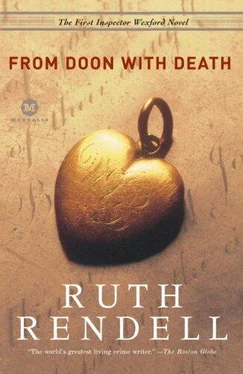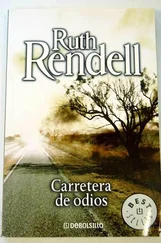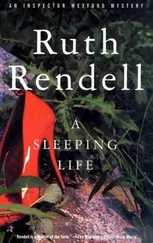Helen Missal interrupted sulkily. ‘Why pick on me? Fabia knew her too, and … Oh, there must be lots and lots of other people.’
‘I’m asking you,’ he said. ‘Tell me about her.’
‘If I do,’ she said, ‘will you promise to go away and not come back?’
‘Just tell me the truth, madam, and I will gladly go away. I’m a very busy man.’
She crossed her legs and smoothed her knees. Helen Missal’s knees were like a little girl’s, a little girl who has never climbed a tree or missed a bath.
‘ I didn’t like school,’ she said confidingly. ‘It was so restricting, if you know what I mean. I just begged and begged Daddy to take me away at the end of my first term in the sixth-‘
‘Margaret Godfrey, Mrs Missal.’
‘Oh, yes, Margaret Godfrey. Well, she was a sort of cipher - isn’t that a lovely word? I got it out of a book. A sort of cipher. She was one of the fringe people, not very clever or nice-looking or anything.’ She glanced once more at the picture. ‘Margaret Godfrey. D’you know, I can hardly believe it I should have said she was the last girl to get herself murdered.’
‘And who would be the first, Mrs Missal?’
‘Well, someone like me,’ she said, and giggled.
‘Who were her friends, the people she went around with?’
‘Let me think. There was Anne Kelly and a feeble spotty bitch called Bertram and Diana Something…’
‘That would be Diana Stevens.’
‘My God, you know it all, don’t you?’
‘I meant boy friends.’
‘ I wouldn’t know. I was rather busy in that direction myself.’ She looked at him, pouting provocatively, and Wexford wondered, with the first flicker of pity he had felt for her, if her coyness would increase as her beauty declined until in age she became grotesque.
‘Anne Kelly,’ he said, ‘Diana Stevens, a girl called Bertram. What about Clare Clarke, what about Mrs Quadrant? Would they remember?’
She had said that she hated school, but as she began to speak her voice was softer than he had ever known it and her expression gentler. For a moment he forgot his anger, her lies, the provocative costume she wore, and listened.
‘It's funny,’ she said, ‘but thinking of those names has sort of brought it back to me. We used to sit in a kind of garden, a wild old place. Fabia and me and a girl called Clarke - I see her around sometimes - and Jill Ingram and that Kelly girl and - and Margaret Godfrey. We were supposed to be working but we didn’t much. We used to talk about… Oh, I don’t know…’
‘About your boy friends, Mrs Missal?’ As soon as the words were out Wexford knew he had been obtuse.
‘Oh, no,’ she said sharply. ‘You’ve got it wrong. Not then, not in the garden. It was a wilderness, an old pond, bushes, a seat We used to talk about… well, about our dreams, what we wanted to do, what we were going to make of our lives.’ She stopped and Wexford could see in a sudden flash of vision a wild green place, the girls with their books and hear with his mind’s ear the laughter, the gasp of dizzy ambition. Then he almost jumped at the change in her voice. She whispered savagely, as if she had forgotten he was there: ‘I wanted to act! They wouldn’t let me, my father and my mother. They made me stay at home and it all went. It sort of dissolved into nothing.’ She shook back her hair and smoothed with the tips of two fingers the creases that had appeared between her eyebrows. ‘I met Pete,’ she said, ‘and we got married’ Her nose wrinkled. The story of my life’
‘You can’t have everything,’ Wexford said.
‘No,’ she said, ‘I wasn’t the only one.. ‘
She hesitated and Wexford held his breath. He had an intuitive conviction that he was about to hear something of enormous significance, something that would iron out the whole case, wrap it up and tie it ready to hand to Mr Griswold. The green eyes widened and lit up; then suddenly the incandescence died and they became almost opaque. Outside in the hall a floorboard squeaked and Wexford heard the squashy sound of a rubber sole on thick carpet. Helen Missal’s face became quite white.
‘Oh God!’ she said. ‘Please, please don’t ask about the cinema ticket. Please don’t!’
Wexford cursed inwardly as the door opened and Missal came in. He was sweating and mere were damp patches on the underarms of his singlet.
He stared at his wife and in his eyes was a strange mixture of disgust and concupiscence.
‘Put something on,’ he shouted. ‘Go on, put some clothes on.’
She got tip awkwardly and Wexford had the illusion that her husband’s words were scrawled across her body like the obscene scribble on a pin-up picture.
‘I was sunbathing,’ she said.
Missal wheeled round on Wexford.
‘Come to see the peep-show, have you?’ His face was crimson with exertion and with jealousy. ‘What the copper saw.’
Wexford wanted to be angry, to match the other man’s rage with his own colder kind, but he could feel only pity.
All he said was, ‘Your wife has been able to help me.’
‘I’ll bet she has.’ Missal held the door open and almost pushed her through. ‘Been kind, has she? That’s a speciality of hers, being kind to every Tom, Dick and Harry.’ He fingered his wet shirt as if his body disgusted him. ‘Go on,’ he said, ‘start on me now. What were you doing in Kingsmarkham on Tuesday afternoon, Mr Missal? The name of the client, Mr Missal. Your car was seen in the Kingsbrook Road, Mr Missal. Well, go on. Don’t you want to know?’
Wexford got up and walked a few paces towards the door. The heavy blossoms, pink, puce and white, brushed against his legs. Missal stood staring at him like an overfed, under-exercised dog longing to let out an uninhibited howl.
‘Don’t you want to know? Nobody saw me. I could have been strangling that woman. Don’t you want to know what I was doing? Don’t you?’
Wexford didn’t look at him. He had seen too many men’s souls stripped to relish an unnecessary spiritual skinning.
‘I know what you were doing,’ he said, skipping the name, the ‘sir’. ‘You told me yourself, just now in this room.’ He opened the door. If not in so many words.’
Douglas Quadrant’s house was much larger and far less pleasing to the eye than the Missals’. It stood on an eminence amid shrubby grounds some fifty feet back from the road. A huge cedar softened to some extent its austere aspect, but when he was half-way up the path Wexford recalled similar houses he had seen in the north of Scotland, granite-built, vaguely gothic and set at each end with steeple-roofed towers.
There was something odd about the garden, but it was a few minutes before he realized in what its strangeness consisted. The lawns were smooth, the shrubs conventionally chosen, but about it all was a sombre air. There were no flowers. Douglas Quadrant’s garden presented a Monet-like landscape of grey and brown and many-shaded green.
After Mrs Missal’s blue lilies, the rhododendrons real and artificial in her drawing-room, this stately drabness should have been restful. Instead it was hideously depressing. Undoubtedly no flowers could bloom because none had been planted, but the effect was rather that the soil was barren or the air inclement.
Wexford mounted the shallow flight of broad steps under the blank eyes of windows hung with olive and burgundy and pigeon grey, and pressed the bell. Presently the door was opened by a woman of about seventy dressed amazingly in a brown frock with a beige cap and apron. She was what was once known, Wexford thought, as ‘an elderly body’. Here, he was sure, there would be no frivolous Teutonic blondes.
She in her turn looked as if she would designate him as ‘a person’, a creature not far removed from a tradesman, who should have known better than to present himself at the front door. He asked for Mrs Quadrant and produced his card.
Читать дальше











